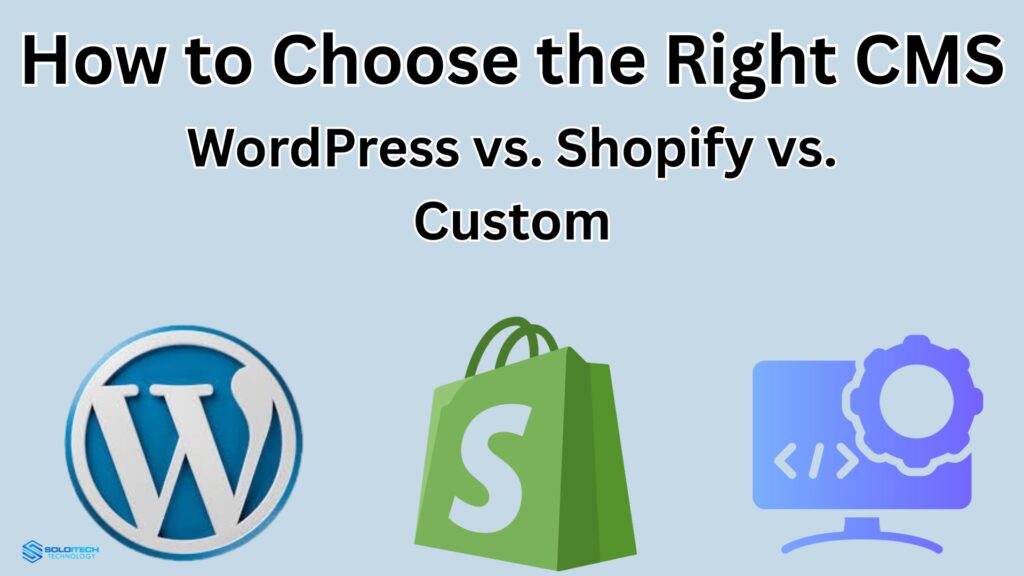Choosing the right Content Management System (CMS) is one of the most important decisions when building a website. Whether you’re building a personal blog, an eCommerce store, or a corporate platform, the CMS you choose will impact your site’s performance, user experience, and long-term scalability.
Three of the most common options are WordPress, Shopify, and a Custom CMS. Each has its pros and cons and best use cases. This article will break down the differences so you can make an informed decision.
What is a CMS
A CMS is the software that powers your website. It allows you to create, edit, and publish content without having to code everything from scratch. In simple terms, it’s the control panel that lets you manage your site’s content, design, and functionality.
But not all CMS platforms are the same. Some prioritize flexibility, others simplicity, and some are tailor-made for businesses that need complete control. That’s where WordPress, Shopify, and custom-built systems come in.
WordPress: Flexibility and Control
WordPress is the most popular CMS globally, powering over 40% of websites. Its popularity comes from its unmatched flexibility and a massive ecosystem of plugins and themes.
Pros of WordPress:
- Highly customizable with plugins and themes.
- Works for almost any type of website, from blogs to e-commerce.
- SEO friendly with plugins like Yoast or Rank Math.
- Cost-effective since the core software is free.
Cons of WordPress:
- Requires regular updates and security checks.
- Beginners may face a learning curve.
- Performance depends heavily on hosting quality.
WordPress is good for businesses that want a balance of flexibility, control, and scalability without breaking the bank.
Shopify: Built for E-Commerce Success
If you’re selling products online, Shopify is one of the easiest platforms to use. Unlike WordPress, Shopify is not a general-purpose CMS. It’s designed specifically for eCommerce businesses.
Advantages of Shopify:
- Extremely beginner-friendly with a quick setup process.
- Built-in tools for payments, shipping, and inventory.
- Fully hosted, so you don’t need to manage servers or security.
- Reliable performance and 24/7 customer support.
Limitations of Shopify:
- Monthly subscription fees, plus transaction charges.
- Limited customization outside its ecosystem.
- Less SEO flexibility compared to WordPress.
Shopify is perfect for entrepreneurs and small to medium-sized businesses that want a simple, reliable, and secure way to sell products online.
Custom CMS: Tailored for Unique Needs
For businesses with very specific requirements, a Custom CMS or Custom website design is the way to go. Unlike WordPress or Shopify, which are pre-built platforms, a custom system is built from the ground up to fit your business needs.
Advantages of a Custom CMS:
- Total control over design and features.
- Optimized performance with no unnecessary code.
- Stronger security measures tailored to your business.
- Scalable to handle large amounts of traffic and complex operations.
Limitations of a Custom CMS:
- Development costs can be significantly higher.
- Ongoing maintenance usually requires a dedicated team.
- Longer development timelines.
A custom CMS is best for large enterprises, SaaS platforms, or businesses with unique workflows that can’t be achieved with off-the-shelf solutions.
Comparing Costs: Which CMS Fits Your Budget?
- WordPress: Free software, but hosting, premium themes, and plugins add to the cost. Typically affordable for small to medium businesses.
- Shopify: Starts at $29 per month, with higher-tier plans for larger stores. Easy to predict costs, but recurring fees add up over time.
- Custom CMS: Usually the most expensive option. Development can cost thousands of dollars, but the investment may be worth it for enterprises.
If cost is your top priority, WordPress is the best value. If convenience matters more, Shopify justifies the monthly fee. For big budgets and long-term goals, a custom CMS delivers the most.
SEO and Growth Potential
Search engine optimization (SEO) is key to organic traffic, so how do these platforms stack up?
- WordPress: Best for SEO flexibility, thanks to plugins and full control over technical stuff.
- Shopify: Decent SEO tools but limited customization, especially with URL structures and technical tweaks.
- Custom CMS: SEO performance depends on how it’s built, great if developers include SEO from the start, terrible if they don’t.
For content marketing and organic growth-focused businesses, WordPress is usually the way to go.
Make Your Choice
In a nutshell, here’s how to decide:
- Choose WordPress if you want flexibility, SEO control, and cost-effectiveness.
- Choose Shopify if your main focus is eCommerce and you want hassle-free.
- Choose a Custom CMS if your business needs unique features, scalability, and you have the budget to invest.
Conclusion
Ultimately, the choice between WordPress, Shopify, and Custom CMS comes down to your goals, budget, and technical expertise.
- WordPress has the most flexibility and SEO power.
- Shopify is an all-in-one solution for online stores.
- A Custom CMS gives you total control, but at a higher cost.
By evaluating your business needs, you can choose a CMS that works today and grows with you tomorrow.

